
Art Gharana — 6 Mins read
Emotional Piano Songs to Play Today
Musical Instruments
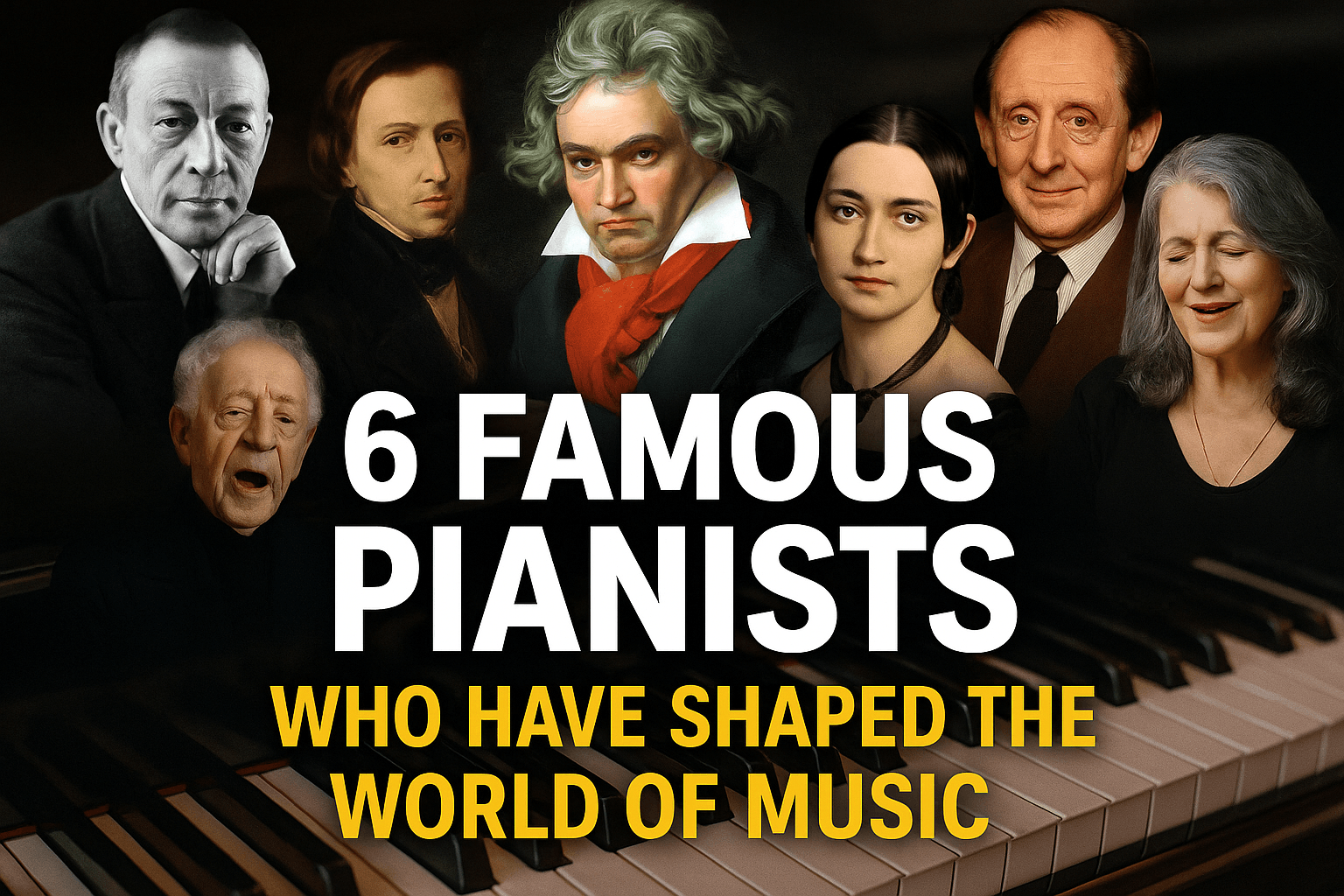
What makes a pianist truly unforgettable? Is it their lightning-fast fingers dancing across the keys, or the way they breathe life into every note? Across centuries and genres, some famous pianist players have done more than just perform — they’ve reshaped how we experience music itself. Whether you're drawn to the elegance of classical compositions or the raw soul of modern pop ballads, chances are your favorite pieces were touched by the genius of a piano master.
In this blog, we’ll journey through time and sound to explore six famous piano musicians who have not only defined their eras but continue to inspire new generations. From the haunting beauty of Chopin’s nocturnes to the cultural impact of Alicia Keys’ soulful melodies, these artists prove that the piano isn't just an instrument — it’s a force of expression.
So whether you're a budding pianist yourself, a music lover, or just curious about the lives behind the melodies, stay tuned. You’re about to meet the legends who turned ivory keys into timeless magic — the most famous pianists the world has ever known.
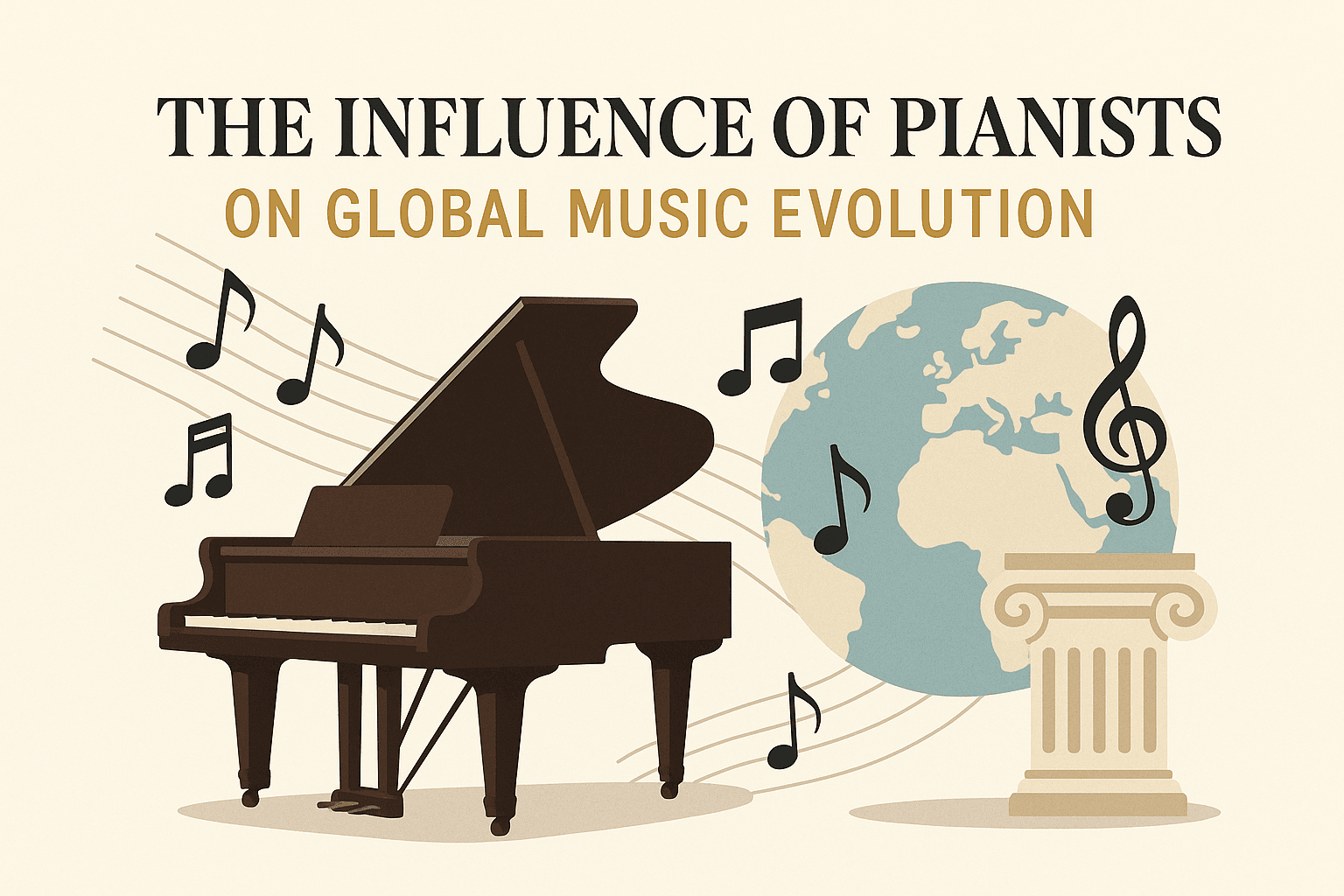
Have you ever stopped to think how deeply the piano has shaped the soundscape of modern music? From the opulent concert halls of Vienna to chart-topping hits on streaming platforms, musicians who play piano have played a powerful role in defining musical expression across centuries.
The piano isn’t just an instrument — it’s an orchestra at your fingertips. With its dynamic range, emotional versatility, and harmonic depth, it has been central to the creative journey of countless artists. From classical compositions to pop ballads and jazz improvisations, the piano adapts to every style yet maintains its distinct voice.
Here’s why the piano holds such a timeless place in music:
The world has witnessed famous piano musicians who were not only masters of the keyboard but also visionaries. These pianist icons often broke boundaries—social, cultural, even political—with the power of their music.
Think of how:
● Beethoven challenged musical norms while losing his hearing. ● Chopin made the piano sing with emotion and poetry. ● Alicia Keys blended classical training with soulful storytelling.
These aren’t just performers — they are cultural catalysts.
Today’s famous piano players of the 21st century continue to inspire and innovate, proving that the piano isn’t going anywhere. With platforms like YouTube and Instagram offering global stages, new piano talents are shaping modern tastes and reaching millions.
So next time you hear a breathtaking piano solo, remember — you’re not just listening to notes. You’re hearing a legacy, one shaped by generations of famous pianist players who changed the way we feel music.
From past to present, piano players have consistently shaped the heartbeat of the music world — and their influence only grows stronger. If you're ready to begin your own musical journey, check out our online piano keyboard classes to get started.
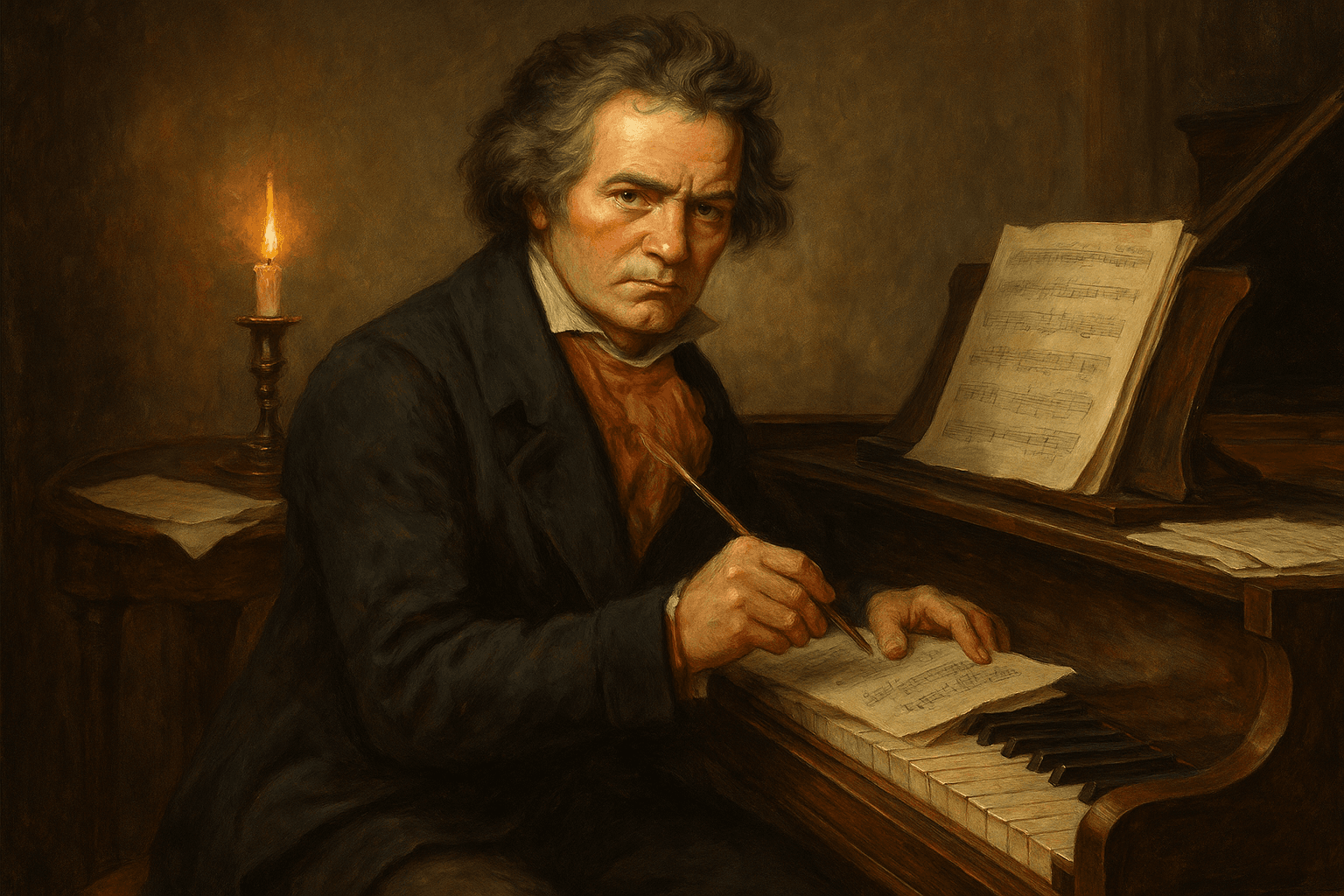
When we talk about the greatest classical piano players of all time, one name always echoes louder than the rest — Ludwig van Beethoven. But what made him such a revolutionary force? And why, centuries later, do his compositions still command awe and admiration?
Beethoven wasn’t just a famous pianist in history — he was a trailblazer. Born in Bonn, Germany in 1770, he emerged during the transition from the Classical to the Romantic era and redefined what it meant to be a composer and performer.
Despite battling progressive hearing loss, Beethoven composed some of the most iconic piano works ever written, including:
Each piece pushed the boundaries of what the piano could express — and what a piano soloist could convey through it.
So, what sets Beethoven apart from others on the list of famous pianists? It’s more than his technical skill. It’s his bold spirit, his relentless innovation, and his refusal to be limited — even by silence.
His impact includes:
His fearless creativity continues to influence famous piano players today, inspiring them to see the piano not just as an instrument, but as a voice for personal and societal transformation.
Beethoven wasn’t just a musical genius; he became a symbol of human resilience and artistic freedom. His legacy has seeped into films, global symphony performances, and even digital piano apps.
When someone asks, “Who is the best pianist in the world?”, many still turn to Beethoven — not just for his skills, but for the soul he poured into every note.
Want to join the legacy? Book a free trial class today and take the first step toward becoming the next name on the list of famous piano players.
![]()
What if a piano could whisper your emotions, echo your thoughts, and speak your soul’s language? That’s exactly what Frédéric Chopin achieved. Among the most famous pianists in history, Chopin carved a space unlike any other — not with volume or spectacle, but with elegance, intimacy, and depth.
Born in Poland in 1810, Chopin wasn’t known for grand public performances. In fact, he preferred the salon over the stage. But what he lacked in performance bravado, he more than made up for with emotionally rich compositions that turned the piano into a lyrical storyteller.
Some of his most celebrated works include:
These works are now a rite of passage for any piano soloist hoping to master expression and control.
You might wonder: Why is Chopin still a central figure on every list of famous pianists? The answer lies in the timelessness of his sound. His music has the rare ability to feel deeply personal yet universally understood.
Here’s how Chopin continues to shape piano music:
Chopin’s style is often described as “singing on the piano,” and that lyrical quality remains unmatched.
Unlike many of his contemporaries, Chopin wrote almost exclusively for the piano. That dedication made him a true piano master — and earned him a place among the best piano soloists of all time.
His music isn’t just studied; it’s felt. It’s cried to, danced to, and remembered. Whether you're a seasoned pianist or simply a lover of beautiful melodies, you’ve likely heard Chopin’s work — in concert halls, in movies, or softly playing in the background of your favorite emotional scene.

Can one pianist embody fire, finesse, and fearlessness all at once? If you’ve ever witnessed Martha Argerich perform, you already know the answer is yes. Often hailed as one of the famous piano players today, Argerich has captivated audiences for decades with a style that’s as explosive as it is emotional.
Born in Buenos Aires in 1941, Argerich was a child prodigy who quickly rose to global fame after winning the prestigious International Chopin Piano Competition in 1965. But beyond accolades, it’s her magnetic presence and intense interpretations that have made her a pianist icon in every sense of the term.
What sets her apart?
Argerich proves that virtuosity and humility can coexist beautifully.
While some modern famous pianists follow the path of polished perfection, Argerich remains refreshingly raw and honest. Her refusal to conform to the classical star image has inspired a new generation of artists to value authenticity over showmanship.
She’s also known for mentoring young talents, serving as both a performer and a guide — a rarity in a competitive field.
Her influence today includes:
Martha Argerich doesn’t just play the piano — she reinvents the way it’s heard. Even in her 80s, she continues to deliver performances with unmatched vitality. Her recordings are studied in conservatories, streamed worldwide, and cherished by fellow musicians.
In a world filled with piano players, Argerich reminds us what it means to be an artist — unfiltered, fearless, and full of fire.
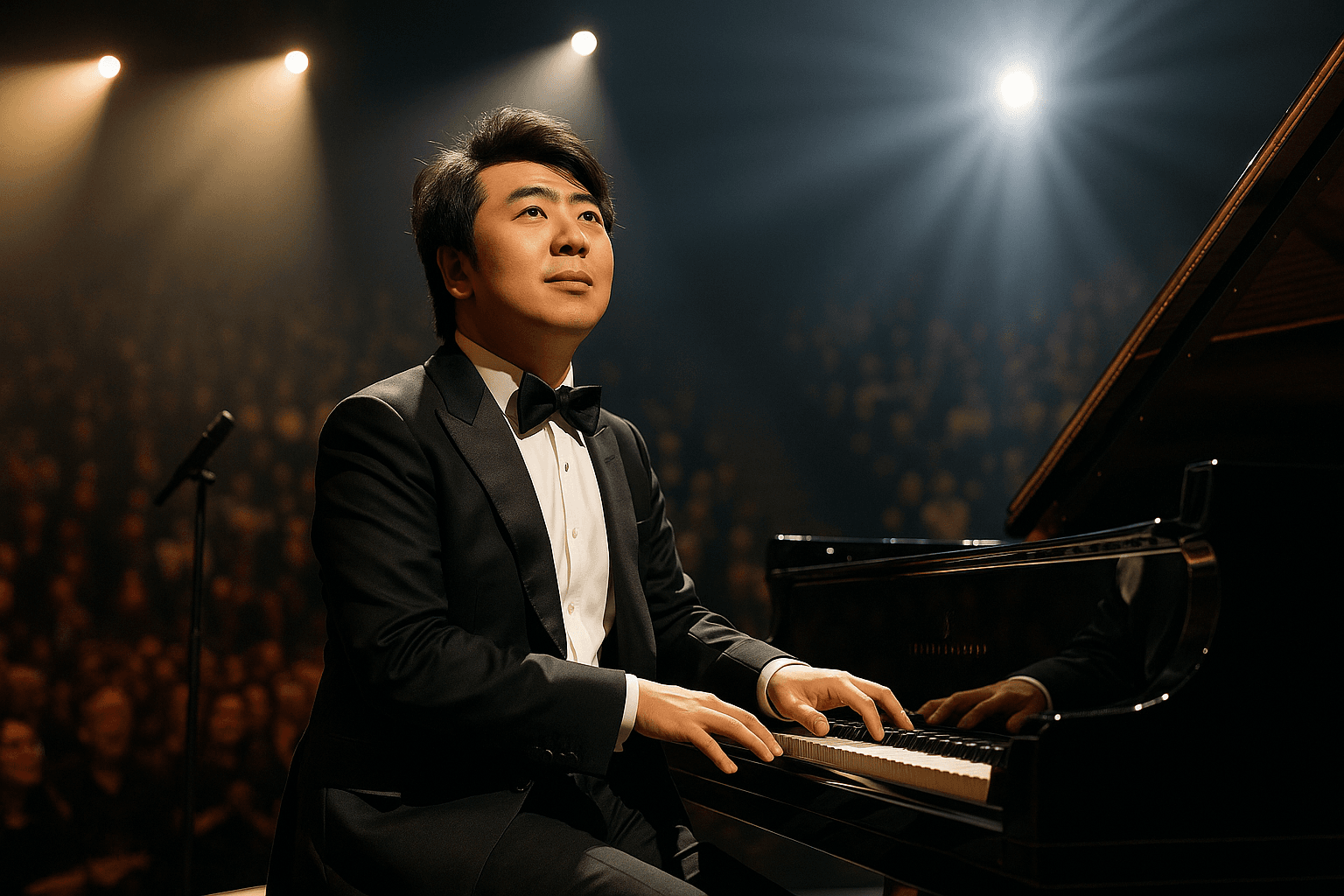
What happens when classical tradition meets global pop culture? You get Lang Lang — a phenomenon who has redefined what it means to be a famous pianist in the 21st century. With a dazzling mix of charisma, technical brilliance, and digital-era savvy, Lang Lang has brought classical piano to audiences who never thought they’d fall in love with it.
Born in China in 1982, Lang Lang began playing piano at the age of three. By the time he was a teenager, he was already being hailed as one of the piano player best talents of his generation. But it wasn’t just his skill that caught the world’s attention — it was his magnetic stage presence and his ability to make classical music feel... well, cool.
What sets Lang Lang apart?
He doesn’t just play — he performs.
Lang Lang has made it his mission to bring classical piano to the masses. And he’s doing it by embracing platforms and partnerships many traditionalists avoid. Whether it’s teaming up with Pharrell Williams or playing alongside Metallica, he’s proven that the piano can be as pop as it is classical.
Why he’s more than just a famous piano artist:
In short, he’s modernizing the image of the piano entertainers without losing the soul of the music.
Lang Lang represents a new generation of modern pianists famous not just for their talent but for their influence. He’s created a blueprint for how today’s musicians can blend artistry with innovation and reach global fame without compromising quality.

Can a pop artist with classical piano roots inspire millions across genres? Absolutely — just look at Alicia Keys. As one of the most famous piano players of today, she’s not only dominated charts but redefined what it means to be a singer who plays piano in the modern music landscape.
Before she was a Grammy-winning icon, Alicia Keys trained in classical piano at the Professional Performing Arts School in New York. Her early foundation gave her the technical strength and emotional sensitivity that would later shape her distinctive sound one where the piano is just as central as her voice. Her breakthrough single, “Fallin’,” wasn’t just a hit — it was a statement: the piano belongs in pop and R&B, and it can drive stories just as powerfully as any beat.
Some of her signature piano-infused hits include:
Each track showcases not only her vocal range but also her command of the keyboard — proving her place among famous piano musicians in the pop world.
What makes Alicia Keys stand out isn’t just her voice or her piano chops — it’s her authenticity. She’s built a brand around vulnerability, empowerment, and real artistry. And through her music, she’s shown that the piano isn’t just for concert halls — it belongs in stadiums, on red carpets, and in playlists worldwide.
She’s impacted the music world by:
Her artistry and advocacy go hand in hand, solidifying her as a piano entertainer who moves both hearts and minds.
Alicia Keys has opened doors for a new wave of pop piano players — artists who embrace the piano not as background, but as the heartbeat of their music. Her influence spans continents, and her commitment to authenticity has made her a role model not just for musicians, but for anyone finding their voice.
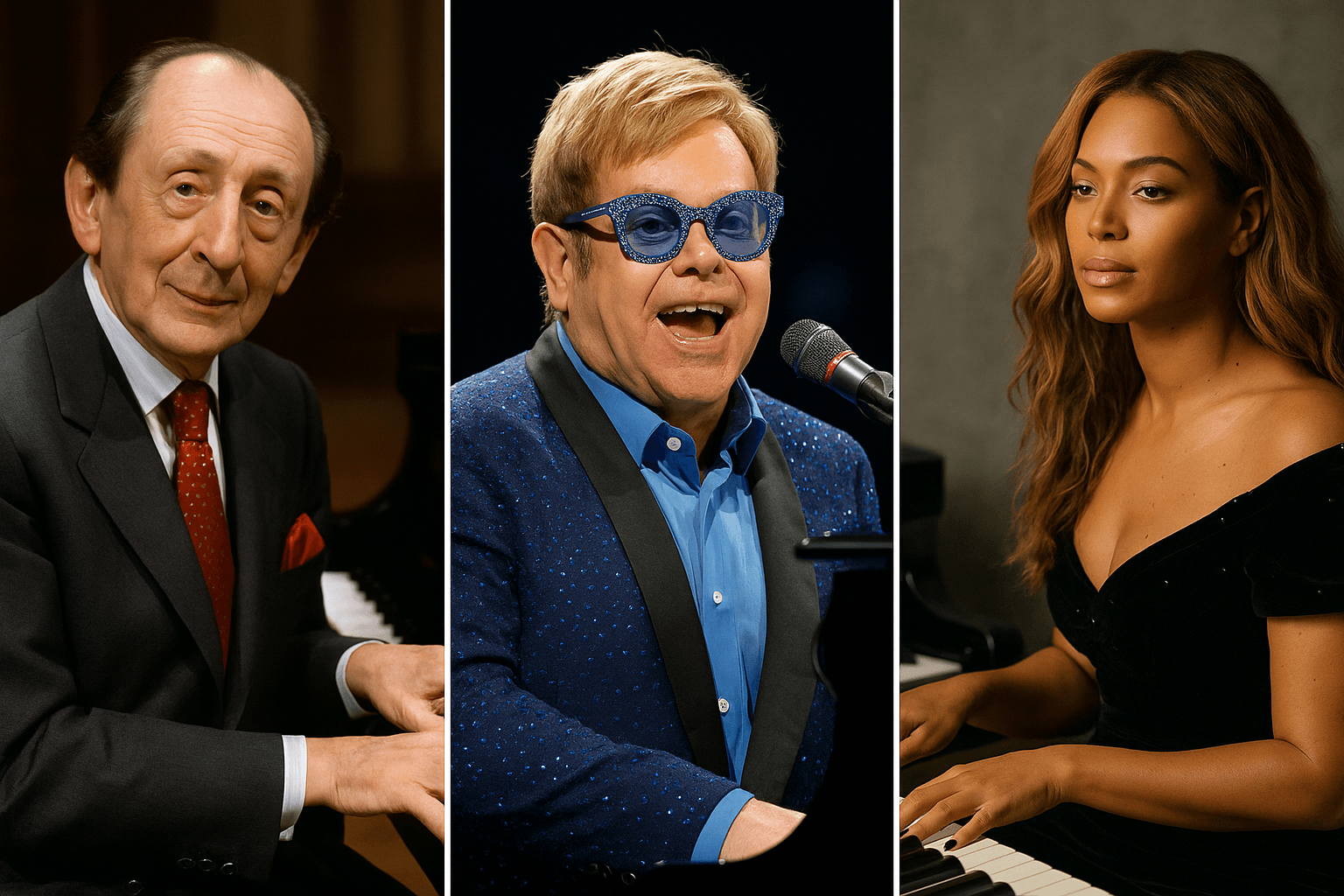
While we've highlighted six of the most groundbreaking famous piano players in history and modern times, the world of piano has been shaped by many more unforgettable artists. Some names might not always top the trending charts, but their impact on music — and on the piano itself — is undeniable.
So, who else deserves a spot on your must-know list of well known piano players? Let’s explore a few more icons whose brilliance continues to resonate.
If you’re fascinated by unmatched precision and expressive depth, Vladimir Horowitz is a name you can’t overlook. Known as the piano master, Horowitz was a legend in every sense.
His recordings remain essential listening for anyone who wants to experience piano performance at its most intense and poetic.
Few artists have blended pop culture and piano performance as seamlessly as Elton John. With his flamboyant style and heartfelt lyrics, he helped bring piano to stadium-sized audiences.
Elton’s influence goes beyond music — he showed that piano can be the centerpiece of mainstream stardom.
While she’s widely known for her powerhouse vocals and electrifying performances, Beyoncé has also showcased her piano skills — a lesser-known but impressive aspect of her artistry.
Though not a full-time pianist, her musical versatility earns her a place among famous people who play piano and keeps fans continuously inspired.
Each of these artists — from classical greats to pop icons — proves that the piano isn’t confined to one genre, era, or personality. Whether you're drawn to dazzling technique, storytelling lyrics, or emotional delivery, the piano provides a canvas for endless creative expression.
So, what is it about these famous piano musicians that continues to move us — decades, even centuries after their first notes were played? Maybe it’s their mastery of storytelling through keys. Or perhaps it’s their fearless innovation, their emotional depth, or the way they made the piano feel like an extension of the human soul.
Whether you’re in awe of Beethoven’s resilience, inspired by Chopin’s lyrical genius, or vibing with Alicia Keys’ soulful power, one thing is clear: these famous pianist players didn’t just play music — they changed it.
As modern famous pianists rise through digital stages and global tours, they carry forward a tradition built by generations of icons. And the best part? This tradition is still alive, growing, and evolving — inviting piano players of all levels to dream, play, and perform.
So ask yourself:
Because the world doesn’t just need more listeners — it needs more voices behind the keys.